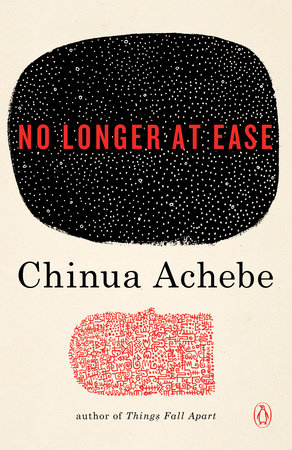“A magical writer—one of the greatest of the twentieth century.” —Margaret Atwood
“African literature is incomplete and unthinkable without the works of Chinua Achebe.” —Toni Morrison
A classic story of moral struggle in an age of turbulent social change and the final book in Chinua Achebe’s The African Trilogy
When Obi Okonkwo, grandson of Okonkwo, the main character in
Things Fall Apart returns to Nigeria from England in the 1950s, his foreign education separates him from his African roots.
No Longer at Ease, the third and concluding novel in Chinua Achebe’s
The African Trilogy, depicts the uncertainties that beset the nation of Nigeria, as independence from colonial rule loomed near. In Obi Okonkwo’s experiences, the ambiguities, pitfalls, and temptations of a rapidly evolving society are revealed. He is part of a ruling Nigerian elite whose corruption he finds repugnant. His fate, however, overtakes him as he finds himself trapped between the expectation of his family, his village—both representations of the traditional world of his ancestors—and the colonial world. A story of a man lost in cultural limbo, and a nation entering a new age of disillusionment,
No Longer at Ease is a powerful metaphor for his generation of young Nigerians.
On sale: September 16, 1994
Page count: 208 Pages
ISBN: 9780385474559
Chinua Achebe (1930–2013)
was born in Nigeria. Widely considered to be the father of modern African literature, he is best known for his masterful African Trilogy, consisting of
Things Fall Apart, Arrow of God, and
No Longer at Ease. The trilogy tells the story of a single Nigerian community over three generations from first colonial contact to urban migration and the breakdown of traditional cultures. He is also the author of
Anthills of the Savannah,
A Man of the People,
Girls at War and Other Stories,
Home and Exile,
Hopes and Impediments,
Collected Poems,
The Education of a British-Protected Child,
Chike and the River, and
There Was a Country. He was the David and Marianna Fisher University Professor and Professor of Africana Studies at Brown University and, for more than fifteen years, was the Charles P. Stevenson Jr. Professor of Languages and Literature at Bard College. Achebe was the recipient of the Nigerian National Merit Award, Nigeria’s highest award for intellectual achievement. In 2007, Achebe was awarded the Man Booker International Prize for lifetime achievement.
“A magical writer—one of the greatest of the twentieth century.”
—Margaret Atwood“African literature is incomplete and unthinkable without the works of Chinua Achebe.”
—Toni Morrison “Chinua Achebe is gloriously gifted with the magic of an ebullient, generous, great talent.”
—Nadine Gordimer“Achebe’s influence should go on and on . . . teaching and reminding that all humankind is one.”
—The Nation“The father of African literature in the English language and undoubtedly one of the most important writers of the second half of the twentieth century.”
—Caryl Phillips, The Observer“We are indebted to Achebe for reminding us that art has social and moral dimension—a truth often obscured.”
—Chicago Tribune“He is one of the few writers of our time who has touched us with a code of values that will never be ironic.”
—Michael Ondaatje“For so many readers around the world, it is Chinua Achebe who opened up the magic casements of African fiction.”
—Kwame Anthony Appiah“[Achebe] is one of world literature’s great humane voices.”
—Times Literary Supplement“Achebe is one of the most distinguished artists to emerge from the West African cultural renaissance of the post-war world.”
—The Sunday Times (London)“[Achebe is] a powerful voice for cultural decolonization.”
—The Village Voice“Chinua Achebe has shown that a mind that observes clearly but feels deeply enough to afford laughter may be more wise than all the politicians and journalists.”
—Time“The power and majesty of Chinua Achebe’s work has, literally, opened the world to generations of readers. He is an ambassador of art, and a profound recorder of the human condition.”
—Michael Dorris3/25/2021

















